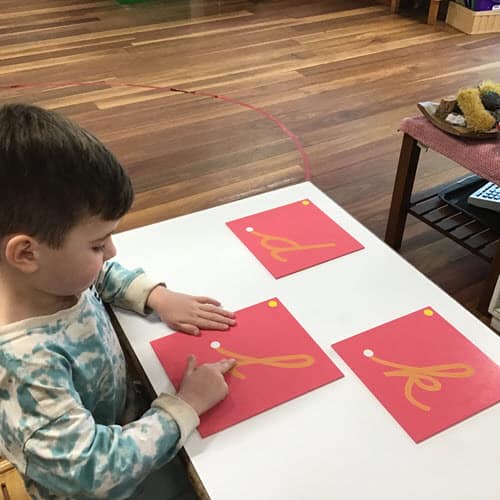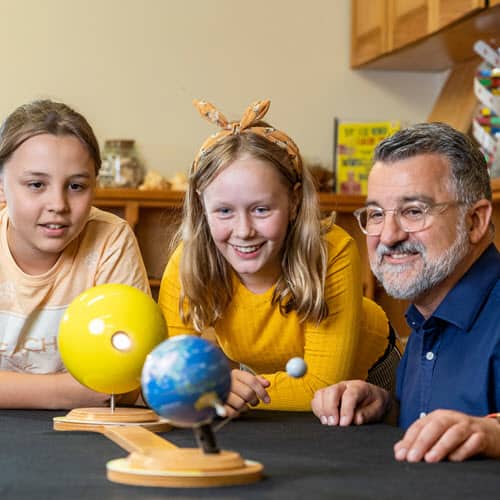We are accustomed to hearing people discuss a variety of Montessori myths, and it’s most often that these misunderstandings come from people who haven’t spent time in a high-fidelity Montessori environment that applies the methods as they were originally intended. The truth is, anyone can call themselves “Montessori”. There’s no trademark on the name, and so it can be pretty misleading to people who are trying to discern what is real Montessori and what isn’t.
You can imagine our surprise, however, when we came across this article [Being a Montessori Teacher Made Me Decide Not to Raise My Kid That Way] written a number of years ago in which the author professes to be a Montessori teacher who chose not to raise her own child that way because of its supposed abundance of downfalls.
Wait, what?
We were so confused. That is, until we read our way through the article and things became a little more clear. We’d like to address some of the main points and criticisms in the article, because we feel these are some of the more common misconceptions.
What first struck us in the second paragraph was this statement: “They (the children) aren’t beholden to any sort of classroom structure”. This is simply false. Montessori classrooms thrive on structure, and we know that children need it to succeed. One of our most repeated mottos is “freedom within limits” and we believe the limits are just as important as the freedom. Children do need choice and we do advocate for building independence, but in our environments they are required to do so within the carefully constructed boundaries created by adults.
Another point made by the author is that she doesn’t understand why parents of three-year-olds would want to pay tuition for their child to just engage in practical life activities all day. Our response is twofold: three-year-olds often prefer to engage in practical life activities for much of the day because it correlates with their development, and practical life is far from all that is offered to young children. Three-year-olds in a high-fidelity Montessori program receive extensive lessons and are presented with materials in the areas of sensorial learning, mathematics, language, biology, geography, and more.

Moving along, the author later states that she feels the child-led model takes things too far. She tells of a seven-year-old who is unable to write their own name because the teachers didn’t make him. Now, we don’t know exactly what was going on here. We suspect this particular school was very unlikely to have been AMI recognised or AMS accredited. In a true Montessori program, children are guided. This means that while they have lots of autonomy, there are expectations, especially as a child enters the primary years. They are not allowed to simply avoid doing the work they don’t enjoy as much; they are given respect and taught a wide variety or time management skills to meet specific goals. They may move at their own pace, but they are still expected to engage in their own learning.
We’ve said it before, but it’s worth repeating. Choosing the right Montessori school for your child is critical. Unless the teachers are trained through very specific programs, and unless the school is either recognized by AMI or accredited by AMS, you can’t be sure that it’s an actual Montessori program. Here at FMS, all our educators are AMI trained and as soon as the global accreditation is made available to us in Australia we’ll be accredited.

The author goes on to share her thoughts on Montessori’s approach to feedback and positive reinforcement. She talks about having to literally sit on her hands to keep herself from interfering with the children’s work. She talks about how Montessori teachers are expected to encourage, redirect, and to reserve judgements like praise and grades. This is all very true. The author doesn’t give an explanation as to why she believes this to be a negative approach, other than it appears that it just doesn’t align with her personal beliefs and inclinations.
It’s true. Many new Montessori educators find themselves consciously avoiding interrupting the children’s work. Our society typically views teachers as the center of the classroom and expects that they are constantly engaged with the children directly. In reality, sometimes the children just need us to get out of their way. They need to discover answers without having them fed directly. They need time to explore and engage with materials in their own way to discover what they cannot when an adult is filtering the experience through his or her own expectations.
The beauty of this approach is that the adult may sit back and observe. We aren’t just doing nothing, rather, we are actively behaving as scientists. The information we gather from observing our students is then used to guide our own future work with the children. It allows us to see their understanding in ways much deeper than we would be able to by administering a test or asking the child to complete a worksheet.
Lastly, we would like to address the assertion that there are no Montessori high schools or colleges. This is false. Is there a need for more Montessori education in the higher grades? Absolutely. The good news is parent interest is increasing, and we are hopeful that the demand will lead to the opening of many new schools. There are Montessori high schools across Australia and internationally. There are also Montessori colleges. One excellent example is TIES.
We know this is just one article of many that perpetuate false ideas about Montessori education, but we hope that by addressing some of those ideas here, we can help to clear things up a bit. Our hope is that high-fidelity Montessori is what will define Montessori of the future, as it is certainly what defines Montessori of the past. Just like it defines FMS today.
Still have questions? Please reach out and ask! We are always happy to have a conversation.



